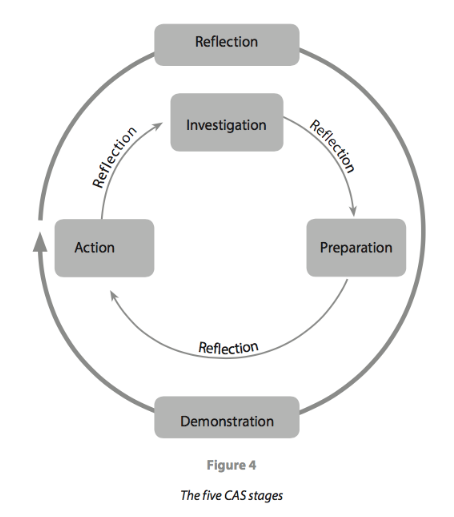CAS PROJECTS
A CAS project is a collaborative, well-considered series of sequential CAS experiences, engaging students in one or more of the CAS strands of creativity, activity, and service. CAS students must be involved in at least one CAS project during their CAS programme.
The primary purpose of the CAS project is to ensure participation in sustained collaboration. Through this level of engagement students may discover the benefits of teamwork and of achievements realized through an exchange of ideas and abilities. A CAS project challenges students to show initiative, demonstrate perseverance, and develop skills such as those of cooperation, problem-solving and decision-making.
A CAS project involves collaboration between a group of students or with members of the wider community. Students work as part of a team, with all members being contributors. A CAS project offers students the opportunity to be responsible for, or to initiate, a part of or the entire CAS project. Working collaboratively also provides opportunities for individual students to enhance and integrate their personal interests, skills and talents into the planning and implementation of CAS projects.
All CAS projects should use the CAS stages as a framework for implementation to ensure that all requirements are met:

The five CAS stages are as follows:
1. Investigation: Students identify their interests, skills and talents to be used in considering opportunities for CAS experiences, as well as areas for personal growth and development. Students investigate what they want to do and determine the purpose for their CAS experience. In the case of service, students identify a need they want to address.
2. Preparation: Students clarify roles and responsibilities, develop a plan of actions to be taken, identify specified resources and timelines, and acquire any skills as needed to engage in the CAS experience.
3. Action: Students implement their idea or plan. This often requires decision-making and problem- solving. Students may work individually, with partners, or in groups.
4. Reflection: Students describe what happened, express feelings, generate ideas, and raise questions. Reflection can occur at any time during CAS to further understanding, to assist with revising plans, to learn from the experience, and to make explicit connections between their growth, accomplishments, and the learning outcomes for personal awareness. Reflection may lead to new action.
5. Demonstration: Students make explicit what and how they learned and what they have accomplished, for example, by sharing their CAS experience through their CAS portfolio or with others in an informal or formal manner. Through demonstration and communication, students solidify their understanding and evoke response from others.
A CAS project can address any single strand of CAS, or combine two or all three strands. The following examples are provided to help generate further ideas without limiting the scope and direction of a CAS project.
• Creativity: A student group plans, designs and creates a mural.
• Activity: Students organize and participate in a sports team including training sessions and matches against other teams.
• Service: Students set up and conduct tutoring for people in need.
• Creativity and activity: Students choreograph a routine for their marching band.
• Service and activity: Students plan and participate in the planting and maintenance of a garden with members of the local community.
• Service and creativity: Students identify that children at a local school need backpacks and subsequently design and make the backpacks out of recycled materials.
• Creativity, activity, and service: Students rehearse and perform a dance production for a community retirement home.
All CAS projects are designed with a defined purpose and goals. Individual students identify one or more learning outcomes to further guide their role and responsibilities in the CAS project. Students will likely identify more outcomes, or modify expected outcomes during the CAS project and/or at its completion.
All CAS project leaders are expected to collaborate on their CAS Project proposal google doc with equal responsibility. This should be agreed with your supervisor and then shared with the CAS Coordinator prior to starting your project.
Steps for project approval:
1. Write your CAS Project Proposal with your group
2. Share it with your supervisor and discuss, amend as needed
3. Share with CAS Coordinator and request a meeting
4. Sign up for a meeting on the schedule the CAS Coordinator shares with you
5. Project will either be approved or you will be asked to make changes and return for another meeting before approval can be given
A minimum of one month commitment is required for a CAS project, from planning to completion. However, CAS projects of longer duration can provide even greater scope and opportunities for all participants and are encouraged. Students should aim to undertake their CAS project locally and, if possible, engage in more than one CAS project over the duration of their CAS programme.
As expected throughout CAS, students reflect on their CAS project experience. Due to the collaborative nature of the CAS project, having occasions to reflect with others can prove most informative and assist students in gaining insights into the process of their endeavour as well as personal growth.
Foodture Cultural Exchange CAS Project PROPOSAL example
